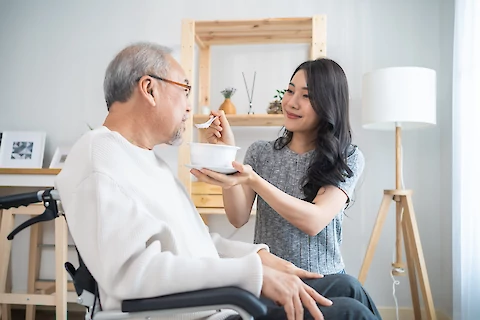
As the discussion around eating disorders typically skews towards younger populations, the senior demographic frequently slips through the cracks. This can lead to a lack of awareness and delayed interventions.
Recognizing and addressing eating disorders in older adults is paramount. With early detection and timely support, you can ensure they will receive the necessary support and care to overcome this challenge.
Eating Disorders in Older Adults
Eating disorders encompass a range of mental conditions characterized by abnormal or disturbed eating habits. While they are typically associated with younger individuals, seniors are not immune. Unfortunately, societal biases and a lack of research often allow these problems to go unnoticed.
Signs and Symptoms of Eating Disorders in Seniors
The symptoms of eating disorders in older adults can often be subtle, making them harder to spot and detect. It is also easy to mistake them for signs of aging or other health conditions.
Physical signs such as sudden weight loss, consistent fatigue, and dental problems may suggest an eating disorder in a senior individual. Behavioral changes could include new obsessions over weight and diet or shifts in eating habits.
Emotional symptoms might be less visible but should not be ignored. Look for signs of depression, anxiety, or increased isolation from social activities. Keep your senior loved one connected to friends and family. Stay vigilant to any changes in behavior to help safeguard against eating disorders and other major health concerns.
Why Eating Disorders Often Go Unnoticed in Seniors
In seniors, the symptoms of eating disorders often overlap with those of other health conditions. This can lead to misdiagnosis or neglect. Societal perceptions and medical biases contribute to a lack of understanding within the caregiving and medical community. There is also a prevalent misconception that only teenagers and young people struggle with eating disorders. However, the reality is that anyone can experience this health issue.
How Caregivers Can Support Seniors With Eating Disorders
Recognizing the signs and symptoms of eating disorders in seniors is the first step toward timely intervention and support. Caregivers play a pivotal role in ensuring seniors are getting all the assistance they need to navigate this challenging time. From encouraging healthy habits to facilitating professional treatment, they are pivotal in a senior’s journey toward recovery and well-being.
Caregivers should broach conversations about eating habits and body image delicately and openly. Seniors dealing with eating disorders can be emotionally vulnerable. Sensitivity in handling the matter is paramount. Adept at navigating such issues, caregivers play a crucial role in providing daily support. They can also help introduce changes to a senior’s routines and diet and liaise with healthcare providers as needed.
Contact Senior Helpers for Compassionate Care and Support
Recognizing and addressing eating disorders in older adults is an essential aspect of providing comprehensive senior care. With timely intervention and appropriate support, you can make a difference in helping senior loved ones navigate this challenge and improve their quality of life.
If you’re in Palo Alto, Santa Clara, Sunnyvale, and Menlo Park and want to explore the benefits of in-home care services for yourself or a senior loved one, contact us at Senior Helpers Palo Alto. We are committed to helping seniors and their loved ones as they navigate the challenges of retirement.